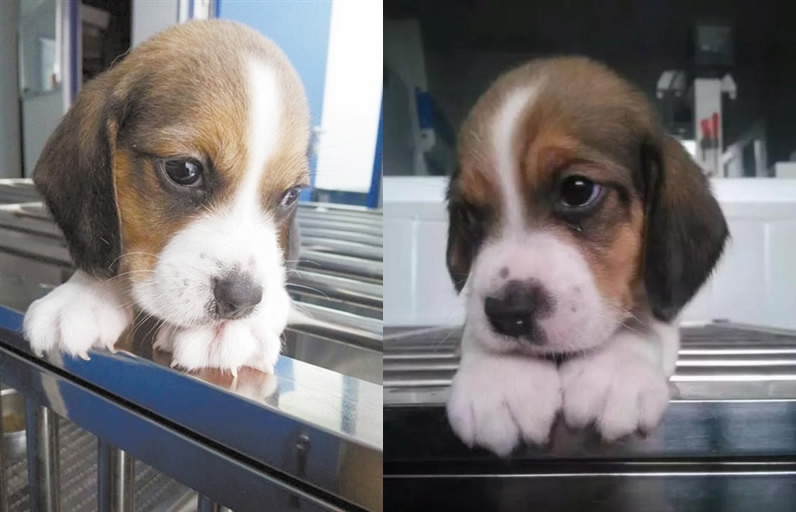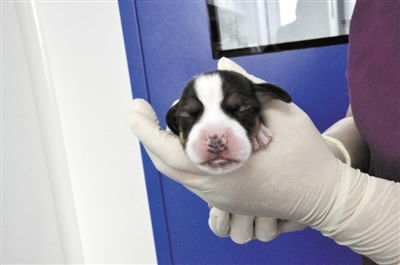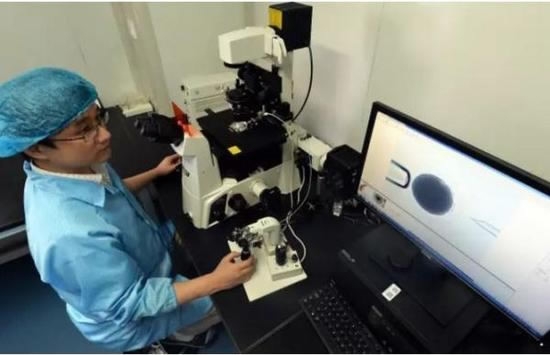Mass production of one's beloved pet dog is no longer a dream, thanks to rapidly-advancing technology.
Beijing-based biotech company Sinogene, announced on Wednesday that they created the world’s first gene-edited cloned dog.

Long Long (L) and Apple (R) /Photo via science and Technology
Two-month-old beagle Long Long looks like a normal puppy, but he is the first of its kind in the world, being cloned from his genetically modified parent.
Long Long’s father, Apple, was born as a laboratory dog for the study of human diseases. The scientists used the latest gene-editing technology CRISPR/Cas9 by taking a somatic cell, which is any cell other than the reproductive ones, from a healthy beagle and removing one of Apple’s genes.

Long Long and his surrogate mother /Photo via Science and Technology
Long Long, born on May 28 in a lab at Sinogene, is not the only cloned dog of Apple. Recently, two more dogs were given to birth with his DNA.
“(The birth of Long Long) marks China becoming the second one to master somatic cell cloning technology, after South Korea,” Lai Liangxue, a researcher at the Guangzhou Institute of Biomedicine and Health under the Chinese Academy of Sciences, told Science and Technology Daily.
Why are dogs so hard to clone?

Long Long /Photo via Science and Technology
After sheep Dolly, the first mammal cloned from an adult somatic cell in 1996, many animals like cows, pigs, cats, rabbits and horses bad been successfully cloned. But it was not until 2005 that a dog was successfully cloned by South Korean scientists using a similar technology which created Dolly.
Lai explained to the Science and Technology Daily that dogs had long been considered as one of the most difficult animals to be cloned. For instance, the quality of their ovary cells is relatively poor.
The implications of gene-edited cloned dog

Apple /Photo via Science and Technology
Shi Zhensheng, a professor from the China Agriculture university claimed the technology has a significant meaning towards biology, saying “the gene-edited dogs have great advantages in helping scientists to research human medicine and genetic diseases, also promoting the study on veterinary medicine.”
Shi added that over 400 out of 900 genetic diseases in dogs are similar with human’s diseases, thus making the canine an ideal laboratory animal.
He also said the cloned dog can prolong a pet dog's life to some extent, seeing as how it's man's best friend.
Another benefit of gene-edited canines is that it can enlarge the numbers and strengthen the physical condition of working dogs, such as sniffer, rescue and guide dogs, said Ye Junhua, working at a Chinese police dog training base.

Researcher is conducting the dog somatic cell nucleus transplanting experiment. /Photo via Science and Technology
However, many netizens hold divided views over the cloned dogs. Some think the technology could cause moral issues while others hope it could improve research and understanding on both dog and human health.
“Please don't do this! Nature is a wonderful thing and you should not mess with it,” Mailonline user Maggie commented.
“Dogs are already fast and strong. But if you could help them to live longer, healthy lives, that would be better,” another Mailonline user Jottings said.
“I hope the technology can be used on organ cloning soon. Many people waiting for organ donations will be saved, and the cases of human trafficking may reduce,” @heseerheseer said on Chinese microblogging platform Weibo.
本站部份资料来自网络或由网友提供,如有问题请速与我们联系,我们将立即处理!
版权所有©四级英语单词 网站地图 陇ICP备2023000160号-4
免责声明:本站非营利性站点,以方便网友为主,仅供学习。